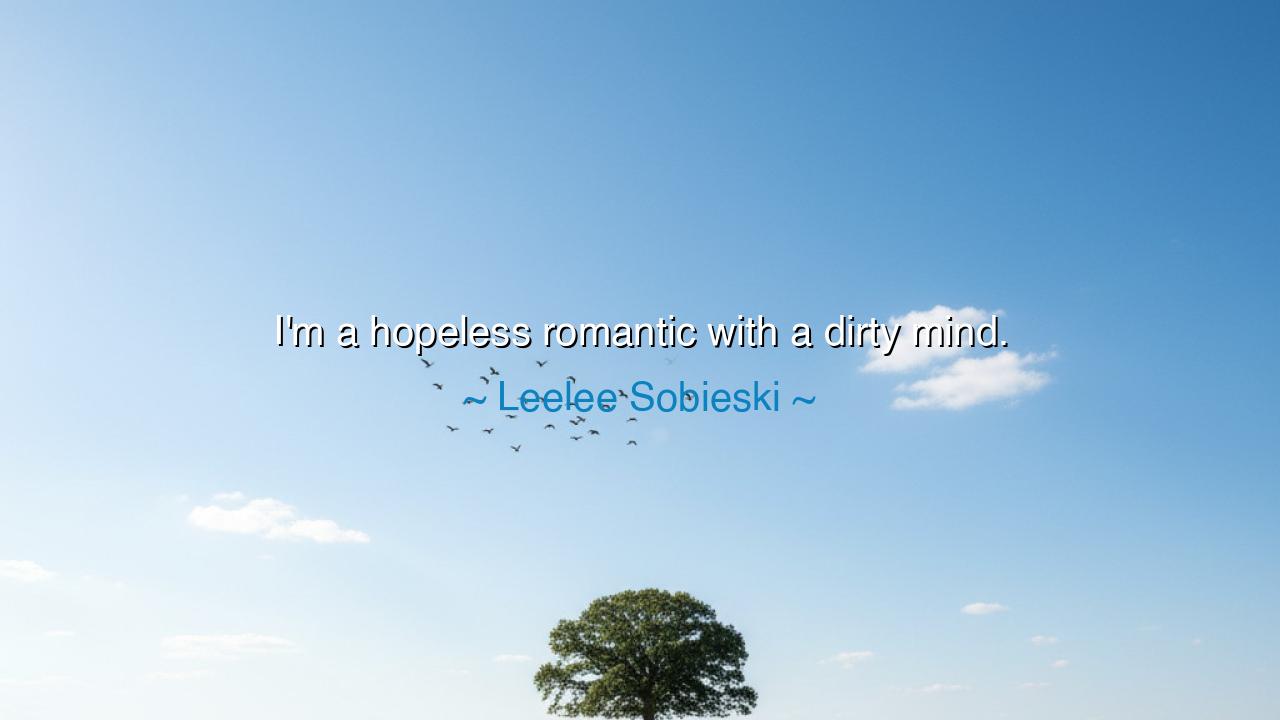
I'm a hopeless romantic with a dirty mind.






"I'm a hopeless romantic with a dirty mind." These words spoken by Leelee Sobieski are an honest, unabashed declaration of the complexity of the human heart and mind. With these words, Sobieski unveils a truth about love and desire—that these two forces, romance and lust, often coexist in the same soul, each pulling in different directions yet both profoundly influencing one another. Her admission of being a hopeless romantic reveals a deep yearning for love—the kind of idealized, timeless love that is etched in the hearts of poets, dreamers, and lovers. Yet, she also acknowledges a primal side, a wildness that breaks the idealized mold and speaks to the complexities of human desire.
In the ancient world, love was never seen as a singular, one-dimensional force. The great Greek philosophers such as Plato and Aristotle divided love into various forms—Eros (passion), Philia (friendship), and Agape (selfless love). Each form had its place in human experience, but Eros—the love of physical desire—was often seen as both beautiful and dangerous. In Homer’s Iliad and Odyssey, love and war are intertwined, and passion and lust are as powerful as the gods themselves. Much like Sobieski’s words, the ancients recognized that love was not just a romantic or idealistic concept, but something that stirred the heart and body in a chaotic, sometimes uncontrollable way.
To be a hopeless romantic is to yearn for something pure—the kind of love that transcends time, the kind of love that consumes and renews. But Sobieski’s introduction of a "dirty mind" reveals the contradiction inherent in all of us: while we may aspire to the sublime and the beautiful, we are also drawn to the raw, the earthy, and the unfiltered. The ancient Romans, for instance, celebrated Eros in their art, often depicting love in its most passionate, sensual forms. They understood that love was not only an emotional connection but also a physical one. The poetry of Ovid, in particular, explored the physicality of desire, while Virgil’s Aeneid blended love with war and destiny, showing the ways in which passion and duty were inseparable forces.
Sobieski’s confession brings to light a duality that exists in all of us. She embodies the very essence of human complexity: the desire for true love, for connection, for the romantic ideal, balanced with the recognition of our fleshly desires, which are just as powerful and raw. Aristotle taught that humans are creatures of both reason and desire, and it is in the tension between these two forces that true character and life are forged. Just as a great warrior might fight with both discipline and ferocity, so too does the human spirit navigate the world of love with both romance and rawness, seeking harmony in the intersection of mind, body, and soul.
Consider the tragic lovers of the ancient world: Cleopatra and Julius Caesar, or Mark Antony and Cleopatra. Their love was not merely the stuff of poetic verse—it was intertwined with politics, war, and desire. These lovers lived in the tension between powerful ambition and raw passion. Their love was both idealistic and deeply grounded in the human experience, in the earthly pleasures of desire, and the emotional ties that bound them together. Sobieski’s phrase—hopelessly romantic yet carrying a dirty mind—captures the essence of this duality. To love fully is to understand that there is no singular expression of affection or desire. There is both purity and wildness, beauty and rawness.
The lesson to take from Leelee Sobieski’s words is one of acceptance—acceptance of the complexity of human emotion and desire. Too often, society urges us to compartmentalize our desires: to label them as either pure or impure, as good or bad. Sobieski’s quote calls us to embrace the full spectrum of human experience. Love does not always fit neatly into our idealized visions; it is at once elevating and earthy, beautiful and untamed. The true power of love lies not in its perfection, but in its authenticity—the willingness to accept both the romantic and the sensual, the divine and the human.
Therefore, let us learn from Sobieski’s words to seek balance in our own lives. To love with abandon, to allow ourselves to desire and dream, but also to honor the physical side of love—to recognize it as part of our full human nature. Love is a force that cannot be tamed or limited by expectations. In its wildness lies its true power, and in its romanticism lies its beauty. Let us be authentic in our desires, accepting the full complexity of who we are, and embracing love in all of its many forms.






AAdministratorAdministrator
Welcome, honored guests. Please leave a comment, we will respond soon